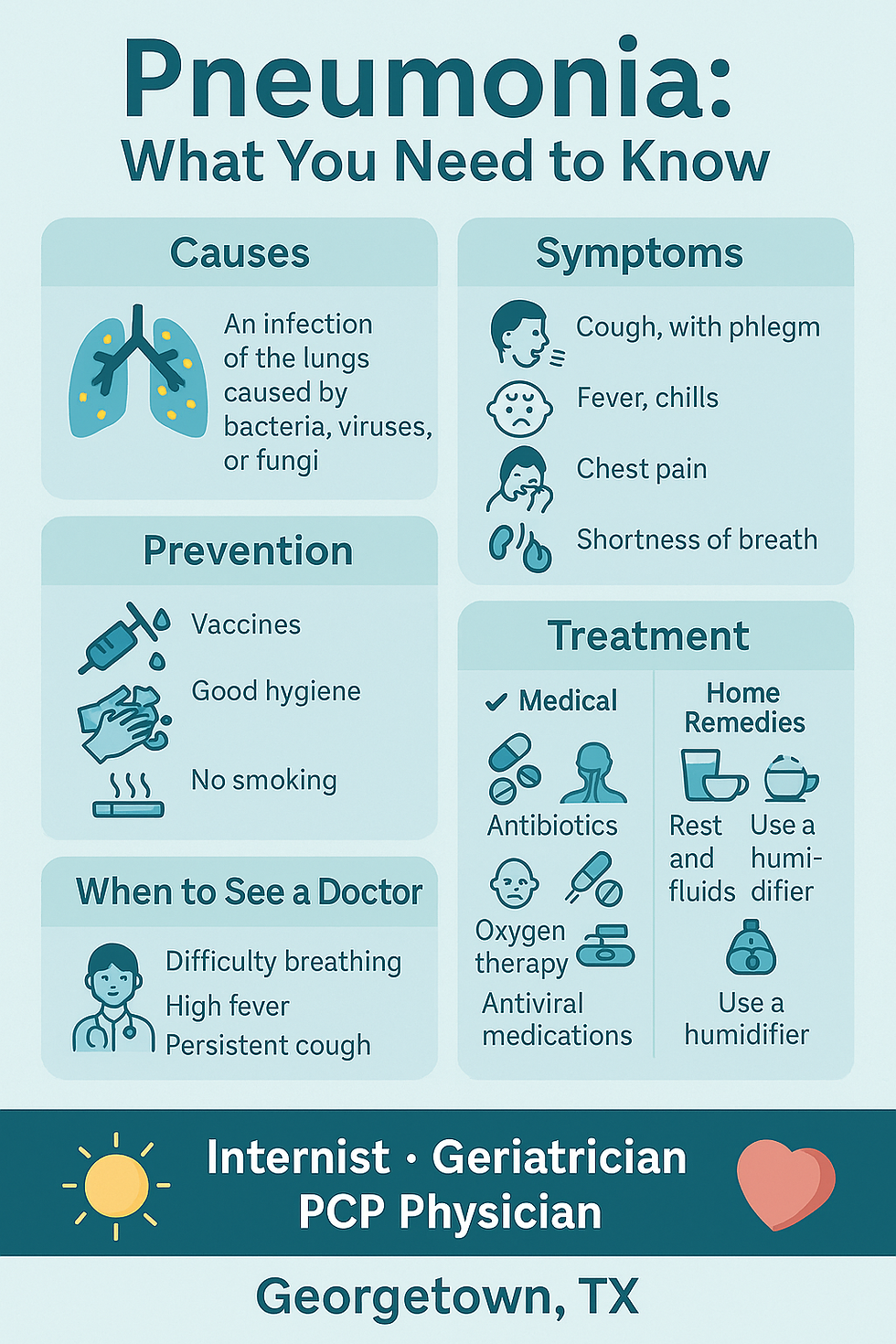🫁 Pneumonia: What You Need to Know – Internist geriatrician PCP physician Georgetown TX
- Dr. Mohammad Al Darawsha MD

- Jul 22, 2025
- 4 min read
Cough that won’t go away? Feeling short of breath, especially during cold weather or after a flu? Pneumonia could be the reason — and while it can be serious, the good news is that it’s also very treatable with the right care.
At Wellness Bay Primary Care, our patients know they’ll get unrushed, thorough care. If you’re looking for an internist, geriatrician, or PCP physician in Georgetown TX, we’re here to help you recover — and protect your lungs for the future.
🌬️ What Is Pneumonia?
Pneumonia is an infection of the lungs that causes the air sacs (alveoli) to fill with fluid or pus, making it hard to breathe. It can be caused by bacteria, viruses, or even fungi.
It ranges from mild to severe, and it’s especially important to catch early in:
Seniors
Adults with diabetes or heart/lung conditions
Smokers or those with weak immune systems
🦠 What Causes Pneumonia? by Internist geriatrician PCP physician Georgetown TX
Common causes include:
Bacterial infections (like Streptococcus pneumoniae)
Viruses like the flu, RSV, or COVID-19
Aspiration (inhaling food or saliva into the lungs)
Hospital exposure for those recently ill or recovering from surgery
🔬 Pathophysiology – What Happens in Your Lungs?
When germs reach the lungs, the immune system sends white blood cells to fight the infection. This creates inflammation, and the lung’s tiny air sacs fill with fluid or pus. That’s why breathing becomes difficult, and coughing often produces mucus.
🚩 Symptoms of Pneumonia
Watch for:
Cough (dry or with yellow/green phlegm)
Fever, chills, and sweating
Chest pain that worsens with deep breaths
Shortness of breath
Fatigue
Low oxygen levels (seen as confusion or bluish lips in seniors)
🔎 How Is Pneumonia Diagnosed?
At our primary care clinic in Georgetown TX, we may perform:
A physical exam (listening for crackles or wheezing)
Chest X-ray to check for infection
Blood tests or sputum culture
Pulse oximetry to monitor oxygen levels
In severe cases: CT scan or hospitalization evaluation
💊 How We Treat Pneumonia
Treatment depends on the cause and severity:
📋 Medical Treatment
Antibiotics (for bacterial pneumonia)
Antiviral medications (like for flu or COVID pneumonia)
Inhalers or oxygen for breathing support
Hospitalization for severe cases (especially in seniors)
🏡 Home Remedies & Supportive Care
Rest often and don’t push yourself
Drink plenty of fluids
Use a humidifier or steam inhalation to loosen mucus
Warm soups and herbal teas (like ginger or licorice root)
Monitor temperature and oxygen at home if advised
We’ll guide you step by step, including safe supplement use if helpful.
🛡️ Prevention Tips – Keep Your Lungs Healthy
Get vaccinated: flu shot, COVID-19 booster, and pneumococcal vaccine
Wash hands often
Avoid smoking
Treat reflux (to avoid aspiration)
Manage chronic diseases like diabetes and COPD
Stay active to improve lung strength
❓ Top 10 FAQs – Pneumonia
💭 Is pneumonia contagious?
Yes — some types are. Viral and bacterial pneumonia can spread through coughing or droplets.
💭 Can I recover at home?
Mild cases can be managed at home with medications and rest. We’ll help you decide.
💭 How long does pneumonia last?
Recovery takes 1–3 weeks, sometimes longer for older adults.
💭 Can it come back?
Yes, especially if risk factors (like smoking or low immunity) aren’t addressed.
💭 What about seniors with confusion or weakness?
In seniors, pneumonia may show up as delirium or falls instead of cough. Always worth checking out.
💭 Do I need an X-ray?
Usually, yes. It confirms the diagnosis and helps track progress.
💭 Can walking pneumonia be dangerous?
It’s milder, but still needs treatment to avoid complications.
💭 Can I take supplements to help?
Vitamin C, zinc, and elderberry may help support immunity — but check with us first.
💭 What’s the best pneumonia vaccine?
There are several options. We’ll recommend based on your age and health.
💭 What if I’ve already had pneumonia once?
We’ll help reduce your risk of it happening again with tailored prevention strategies.
🩺 When to See a Doctor
Come see us at Wellness Bay Primary Care if you notice:
Trouble breathing or chest pain
Cough with mucus that’s worsening
Fever >101°F that lasts more than a few days
Low energy, confusion, or poor appetite — especially in seniors
Concern after a cold or flu that isn’t going away
Our trusted internist, geriatrician, and PCP physician in Georgetown TX will help you get answers, recover quickly, and stay protected.
👨⚕️ How We Can Help at Wellness Bay
At our primary care clinic in Georgetown TX, we:
Screen for early signs
Offer guidance on supplements and diet
Refer to trusted specialists when needed
Monitor health factors like blood pressure, cholesterol, and diabetes
Take time to explain everything in plain language
We’re not here to rush you — we’re here to help you stay independent, informed, and confident in your care.
💬 Let’s Keep You Healthy, Together
The Medicare Wellness Visit is your chance to pause, plan, and protect your future health. At Wellness Bay Primary Care, we make this visit meaningful, respectful, and centered on you.
📍 Visit us at 4887 Williams Dr Ste 107, Georgetown TX
📞 Call 512.588.7008 or📲 Book online
Proudly, our Internal Medicine Primary Care Practice is Accepting new patients From:
Georgetown, Sun City, Round Rock, Cedar Park, Leander, Liberty Hill, Florence, Jarrell, Taylor, Hutto, Pflugerville, North Austin, Brushy Creek, Temple, Harker Heights, Bartram, Lampasas, Killeen, Lago Vista, and surrounding areas across Williamson County and North Austin TX
📍 Related Links




